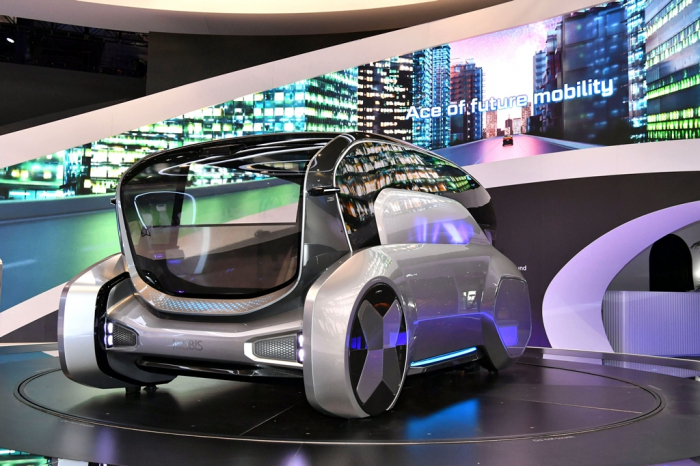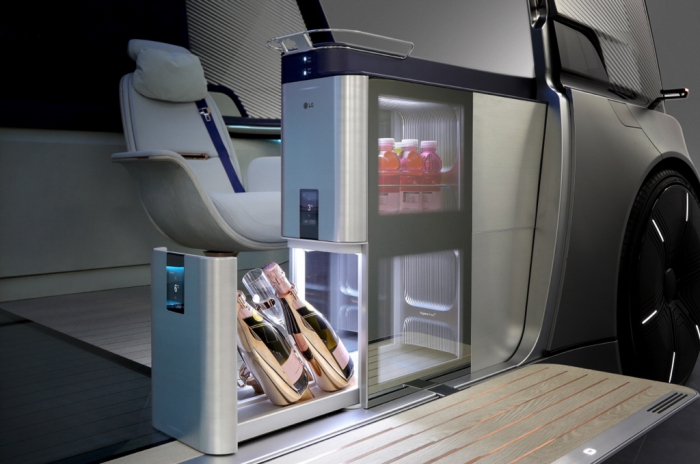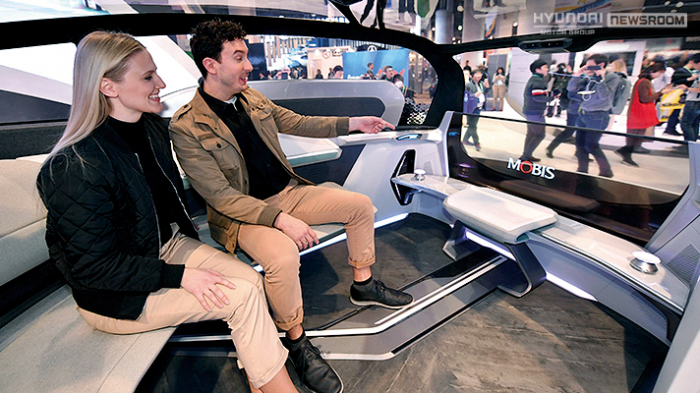Samsung sets sights on new chips for self-driving homes on wheels
Samsung’s ‘home appliance’ chips will be used for household gadgets as well as future mobility vehicles, including EVs
By Nov 03, 2022 (Gmt+09:00)
LG Chem to sell water filter business to Glenwood PE for $692 million


Kyobo Life poised to buy Japan’s SBI Group-owned savings bank


KT&G eyes overseas M&A after rejecting activist fund's offer


StockX in merger talks with Naver’s online reseller Kream


Mirae Asset to be named Korea Post’s core real estate fund operator



For decades, Samsung Electronics Co. has been a household name in the semiconductor industry, making chips that work like the human brain for computers and smartphones.
The South Korean tech giant is now setting its sights on semiconductor chips solely for home appliances such as refrigerators, washing machines and cleaners – a concept that major chipmakers around the world are closely looking into as automakers strive to roll out fully autonomous vehicles in the very near future.
Samsung, the world’s largest memory chipmaker, will begin to develop the so-called home appliance chips by year-end to put semiconductors that can store data and control household gadgets on a small, thin silicon wafer chip, people familiar with the matter said on Thursday.
The company is also working on home appliance chips to be used in future mobility vehicles, including electric cars, the people said.
“Developing home appliance chips is a challenge even for major chipmakers like Samsung, which has been the top memory player for decades. Samsung wants to take the lead in the newly emerging market for homes on self-driving cars,” said one of the sources.

LIVING ROOM ON THE MOVE
Samsung’s move comes as carmakers are reconfiguring the cabin of future mobility vehicles, including EVs, with a spacious interior, blurring the distinction between home and car.
Electronics companies such as LG Electronics Inc., the UK’s Dyson Ltd., Whirlpool Corp. and China’s Haier Group Corp., have already joined the race to turn cars into living rooms on the move.
LG, a leading Korean household appliance maker, unveiled an autonomous vehicle concept dubbed the LG Omnipod earlier this year.
The self-driving home on wheels is fitted with its home appliances, including a refrigerator, a drink dispenser and TVs, retooled for in-vehicle use and provided with artificial intelligence concierge services, according to LG.
China’s Haier has also focused its resources on developing smart home appliances following its acquisition in 2016 of the home appliance division of General Electric Co. (GE), a US multinational conglomerate.

In 2009, the Chinese company changed its name to Haier Smart Home from Qingdao Haier in a show of determination to manufacture smart home appliances.
Technological cooperation is already underway between major home appliance makers and automakers eager to get ahead of their rivals in the future mobility sector.
As part of such a move, LG supplied air purifiers to Hyundai Motor Co. for use in its IONIQ 5 crossover last year.
According to German market research firm Statista, the global home appliance market is forecast to grow to $538.6 billion by 2024 from $448 billion in 2021.
“Competition among electronics makers is becoming fiercer with the imminent arrival of the autonomous driving era. Having a new technology is a matter of life and death for them now more than ever,” said an industry official.
Write to Ji-Eun Jeong at jeong@hankyung.com
In-Soo Nam edited this article.
-
 EarningsSamsung reiterates no memory chip output cut despite weak Q3 results
EarningsSamsung reiterates no memory chip output cut despite weak Q3 resultsOct 27, 2022 (Gmt+09:00)
2 Min read -
 Korean chipmakersSamsung mulls new foundry plant in Europe, to expand outsourcing
Korean chipmakersSamsung mulls new foundry plant in Europe, to expand outsourcingOct 19, 2022 (Gmt+09:00)
3 Min read -
 Tech, Media & TelecomZuckerberg meets with Samsung executives over Meta Quest Pro
Tech, Media & TelecomZuckerberg meets with Samsung executives over Meta Quest ProOct 17, 2022 (Gmt+09:00)
2 Min read -
 AutomobilesHyundai Mobis, Luxoft to unveil infotainment system for future mobility
AutomobilesHyundai Mobis, Luxoft to unveil infotainment system for future mobilityOct 11, 2022 (Gmt+09:00)
1 Min read -
 AutomobilesHyundai Mobis’ smart cabin: Healthcare center on the move
AutomobilesHyundai Mobis’ smart cabin: Healthcare center on the moveJun 23, 2022 (Gmt+09:00)
2 Min read -
 Future mobilityHyundai Mobis to spend $6.7 bn in future mobility, hike shareholder return
Future mobilityHyundai Mobis to spend $6.7 bn in future mobility, hike shareholder returnFeb 23, 2022 (Gmt+09:00)
2 Min read -



